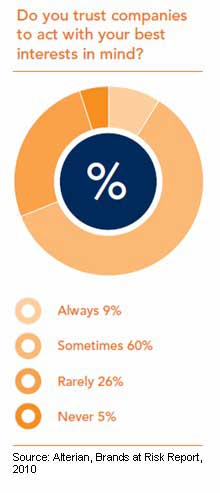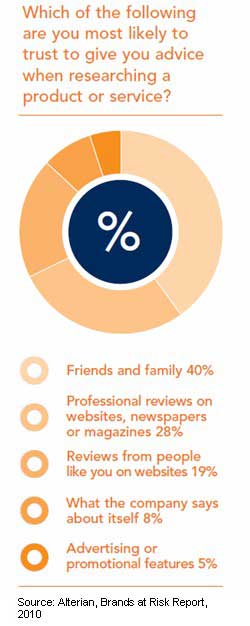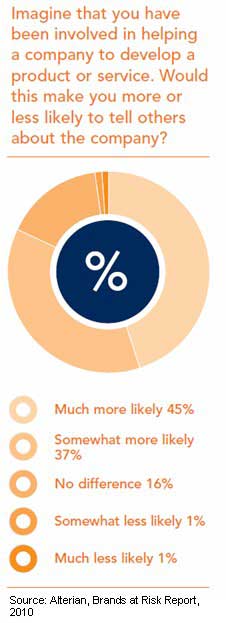Consumers who actively engage with social media are more positive about their connections with brands: 35% of those who use social media say they believe "companies are genuinely interested them," compared with just 16% of all consumers, according to a study by Alterian.
Moreover, only 8% of all consumers surveyed say they believe "what a company says about itself," and a mere 5% say they trust advertising.
Below, other findings from Alterian's Brands at Risk Report, which examines changes in the way consumers are listening to and engaging with brands.
Today's consumers are deeply cynical about companies: 58% say companies are only interested in selling products, without regard for what's right for consumers.
Asked whether they trust companies to act with their best interests in mind, 60% of consumers say they do sometimes, while 26% say they do rarely, and just 9% say they always trust companies to act in their best interest.

Only 17% of consumers say companies take note of their opinions.
Today's empowered consumers assemble their own opinions on products and services: Nearly all consumers (95%) say they conduct some form of comparison shopping prior to purchases.
Among those consumers, 46% use direct price-comparison websites and 35% use blogs and other search related methods.
Overall, 81% of consumers say the Web is the first place they go to compare products and services.
Most Trustworthy Sources of Information
Consumers cite family and friends (40%) as the most trusted source of information when researching products and services, followed by professional reviews on the Web and in magazines (28%), and reviews on websites from people like them (19% among all respondents, 24% among US).

Consistent with earlier findings, formal messages from a company or brand rate very low on consumers' trust barometer: Just 5% of consumers say ads are a trustworthy source of information when research products.
Looking for real, hard data that can help you match social media tools and tactics to your marketing goals? The State of Social Media Marketing, a 240-page original research report from MarketingProfs, gives you the inside scoop on how 5,140 marketing pros are using social media to create winning campaigns, measure ROI, and reach audiences in new and exciting ways.
Rebuilding Trust via Social Engagement, Co-Creation
Companies can start to rebuild consumer trust by listening: 75% of consumers say there would be a positive impact if companies were to take more time to find out about their needs and interests.
However, companies also need to establish dialogue in multiple channels to suit the needs of all consumers. For example, 90% of consumers who use social media say it is an appropriate channel for brands, provided the company is transparent about who is talking.
Involving consumers in the development of products and services—co-creation—is a means to start engagement, or reward existing engagement: 82% of consumers and 91% of social-media users say they would be much or somewhat more likely to tell others about a company if they have been involved in developing its products and services.

"Consumer trust is at an all-time low," said David Eldridge, CEO of Alterian. "What we are witnessing is an era of individualization. It is no longer adequate to adopt a strategy of mass broadcast and one-way conversations. Brands should be trying to understand communities rather than focusing on siloed communication channels."
"Meeting the challenge of individualization will require new thinking in the collection of customer information/data for an organization to be able to interact at a personal level," said Professor Michael Hulme, author of the report.
"This will call for a commitment from the business to both structural and skill changes, arising from the need to break down silos, both departmentally and functionally to address the 'single view' of information but to also understand how the information is being used at any one time across the organization," Hulme added.
About the data: The report Your Brand: At Risk or Ready for Growth? was written by Michael Hulme, Professor and Associate Fellow of the Institute for Advanced Studies at Lancaster. Findings consist of four empirical studies: An online survey of 1,000 US consumers in March 2010, an online survey of 1,000 UK consumers in January 2010, face-to-face interviews with 40 consumers age 18-60 in 2010, and face-to-face interviews with 15 marketing professionals in 2010.



